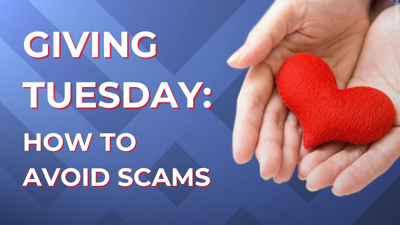DELAWARE - Giving Tuesday is an annual event to encourage generosity and donations to a wide variety of charities at the start of the holiday season. Though many Delawareans give to non-profits to support causes they believe in, scammers are expected to take away millions of dollars from legitimate charities, according to NBC News.
DON'T GET SCAMMED
- Don't respond to pressure to contribute on the spot. If you're not familiar with a charity, request additional information in writing. Donors have a right to say no and legitimate organizations will not pressure people to give immediately.
- "Tax exempt" and "tax deductible" mean two different things. "Exempt" means the organization does not have to pay taxes. "Deductible" means donors can deduct contributions on income taxes.
- Don't be enticed by sob stories and emotional appeals.
- Donate directly to a charity instead of through a third party.
- Ask for specific information, like how money will be used and where it will go, in writing.
CHECK A CHARITY
The BBB Wise Giving Alliance publishes information to help donors make decisions about how, what and to whom to give. It provides guidance on specific issues like tax exemptions, and also has a national alphabetical list and search option to look up a charity before donating. The alliance recommends people avoid or be cautious when contributing to nondisclosure charities, which do not provide requested information or supporting documents as part of a legitimacy evaluation.
While this could be benign, the BBB says some of these charities could also be hiding something by choosing not to disclose.
Charity Navigator has information for donors about protecting your information and deciding what data you share with charities. It also helps people navigate opportunities to donate time by finding legitimate volunteer needs.
Though the tax system can be confusing and ever-changing, Charity Navigator has a list of resources for donors to peruse regarding charitable tax deductions, the Interactive Tax Assistant from the IRS and more tax-smart ways to give.
CharityWatch is a national, independent charity watchdog. According to its website, it dives into audited financial statements, tax filings and state solicitation filings to determine how efficiently a charity will use donations to fund the programs it says it will.
For tax purposes, CharityWatch recommends requesting a charity's tax exempt letter. If a charity does not have a tax exempt letter indicating its status with the IRS, donors cannot legitimately claim contributions as a tax deduction. The IRS offers a tax exempt organization search tool to check a charity's eligibility to receive tax-deductible contributions.
The group also encourages donors to ask where their money will specifically go. According to CharityWatch, most highly efficient charities are able to spend 75 percent or more on their programs, though newer groups and those that focus on less-popular issues may spend a greater percentage of donation dollars on additional fundraising efforts and administrative costs. The group also encourages people to give directly to an organization instead of a third party to ensure the total goes to the organization instead of being cut down or even diverted by a middleman.
HOW TO REPORT SCAMS
Donors who believe they've been contacted by scammers posing as a charity can file a report with the Fraud and Consumer Protection Division through the Delaware Department of Justice and Attorney General's office. More information and a complaint form are available at attorneygeneral.delaware.gov. The fraud division can also be reached at 302-577-8600.







